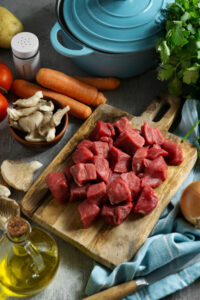What is Halal Meat?
The Arabic word halal means Halal Meat and Regular Meat”permissible,” and halal meat refers to meat prepared according to Islamic law. Before slaughtering an animal, a Muslim butcher offers a prayer and follows specific guidelines.
The process of producing regular meat is as follows:
Alternatively, regular meat may be produced by non-Muslims without following any specific slaughter or preparation guidelines. Stunned animals are less likely to suffer pain and stress during slaughter, and they can be slaughtered using a variety of methods, including electrocution, gas, or captive bolt guns.
Why is Halal Meat So Popular?
Some people choose to eat halal meat because they believe that it is cleaner, healthier, and more humane. In Islamic law, animals must be well cared for and fed a natural diet without animal byproducts, hormones, or antibiotics.
As the slaughter process aims to minimize the pain and stress of the animals, it is also considered more humane. A further way to ensure the safety and quality of the meat is to inspect the animal for any diseases or abnormalities before slaughter.
For various cultural and religious communities around the world, halal meat and regular meat are distinct categories of meat. Both are prepared differently, sourced differently, and adhere to different dietary guidelines. Let’s explore the differences and significance of each type of meat in more detail.
Meat that is Halal:
In the Quran, halal meat is meat that adheres to Islamic dietary laws. In Arabic, the word “halal” means “permissible.”. In order for meat to be considered halal, it must meet the following requirements:
Halal meat is produced using a particular slaughter method. Muslims must slaughter animals using sharp knives, ensuring a quick and humane process. Prior to slaughter, Allah (God)’s name must be invoked, and the animal must be alive and healthy.
Pork or pork byproducts are strictly prohibited in Halal meat. There is no permissible meat from pigs in Islam.
Alcohol and intoxicants should not be fed or given to animals.
Halal does not include animals that eat other animals (carnivores). Exceptions include certain fish that are permissible despite being carnivorous.
The treatment of animals during their lives and during slaughter should be compassionate.
Meat on the regular:
Meats that do not specifically follow halal guidelines are referred to as regular meat, also known as conventional meat. Culture, region, and individual preferences may influence the sourcing, handling, and preparation of regular meat. Conventional meat production does not follow religious dietary laws regarding slaughter methods and feeding practices.
The significance and considerations of this study are as follows:
Halal meat consumption is a religious obligation for practicing Muslims, not just a dietary preference. As a result, they achieve spiritual purity and ethical responsibility by adhering to Islamic principles. As a result, halal meat plays a pivotal role in Islamic culinary traditions and customs.
However, individuals of all backgrounds and beliefs consume regular meat. Depending on local laws, cultural norms, and personal preferences, regular meat is produced and consumed.
In conclusion
Generally, halal meat is prepared differently and produced according to different guidelines than regular meat. Others may not notice a significant difference in taste or quality when eating halal meat for religious or ethical reasons.
It is always important to buy meat from a trusted source and practice proper food safety regardless of the type of meat you choose to eat. You should find a halal butcher who follows the appropriate guidelines and practices if you are looking for halal meat.
One of the benefits of buying halal meat online from us is that we offer high quality meat. We will ensure your satisfaction by taking your order at any time.

